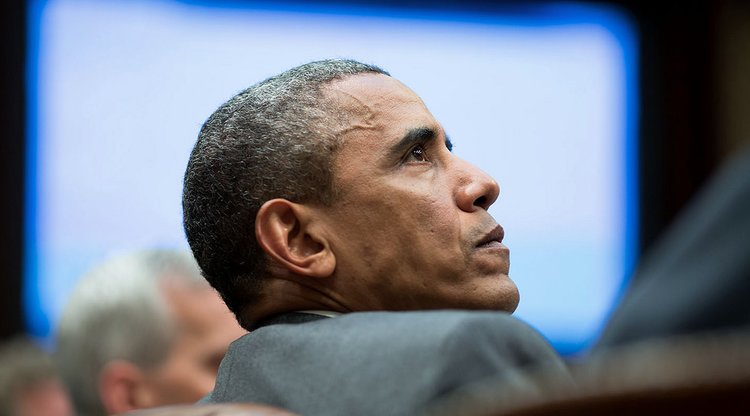The US Congress—the only branch of government that can declare war—will finally have a debate about President Obama’s six-month-old battle with ISIS. How Long Island’s Congressional delegation will vote is still up in the air.
The Obama administration’s military offensive against the brutal terrorist organization, which has laid siege to large swaths of Iraq and Syria, and is responsible for the slaying of four Americans and countless religious minorities and so-called “infidels,” has persisted for half a year without any legitimate discussion in Congress about how long the US will be entangled in the war, if ground troops will ever step foot in Iraq or Syria, or whether the current conflict is even legal.
At the outset of the war, the Obama administration said the 2001 Authorization to Use Military Force (AUMF) provided the president legal authority to battle ISIS.
“We do not believe the President needs that new authorization in order to take sustained action against ISIL,” a senior administration official said in a background call with reporters in September. “We believe that he can rely on the 2001 AUMF as statutory authority for the military airstrike operations he is directing against ISIL, for instance.”
That version has been criticized as overbroad and outdated because it authorized President George W. Bush to use force against those responsible for the Sept. 11, 2001 attacks, meaning al Qaeda. ISIS did not exist at the time, and although it was eventually born out of al Qaeda, the group disavowed ISIS last year.
Obama prefers a bipartisan authorization to use military force (AUMF), ostensibly to portray a unified front against America’s latest enemy.
On Wednesday, the president sent a draft letter to Congress outlining a new AUMF, one that would authorize a three-year offensive against ISIS, also known as ISIL or the Islamic State. Obama’s version also includes any “associated forces” fighting alongside ISIS or any “closely-related successor entity.” It would also sunset the 2002 AUMF, which enabled Bush to “defend the national security of the United States against the continuing threat posed by Iraq.”
Essentially, Obama wants authorization for a war he’s already fighting, using a 14-year-old authorization for military force enacted exactly one week after 9/11 that gives the administration sweeping powers to ether detain or kill militants in undeclared warzones. It’s also been used to justify the drone attack that killed US citizen Anwar Al-Awlaki in Yemen and Samir Khan, editor of the al Qaeda magazine Inspire, who spent his teenage years in Westbury. The government has said Khan was not targeted in the strike.
The authorization, if approved by Congress, sets no geographical boundaries, meaning the US can essentially fight ISIS anywhere. It also prohibits ground troops in “enduring offensive” combat operations, but gives the president enough wiggle room to call in Special Forces if the opportunity exists to take out high-level ISIS militants. That ambiguity has some liberals in Congress worried the US could get be mixed up in another open-ended war, with no reasonable end date.
Obama’s proposal was also greeted with skepticism from Republicans. Some on the right criticized Obama’s AUMF for allowing it to sunset in three years, which they argued, is as good as giving the enemy America’s playbook. Rep. Peter King (R-Seaford) is one of them.
“I’m from the school who believes that the president has the inherent power to do this without Congressional authorization,” King told the Press. “Having said that, it’s always better to get it. But if you are going to get it, don’t be putting limits on yourself. Again, he did this with Afghanistan, where he said he was going to, back in ’09, there’s going to be a troop surge but they’re going to be pulled out within 18 months. Well, they’re just giving the enemy the opportunity to plan their defenses against what we do.
“We should never tell them how long we’re going to be there, what we’re going to do,” he continued. “You’re not limited at all as far as the enemy is concerned…Again, let them think the very worse, and be uncertain at all times.”
LI’s freshmen Representatives were non-committal.
Rep. Lee Zeldin (R-Shirley), unlike King, appears to want more specifics laid out in Obama’s proposal, blasting it as “barren on strategy.”
Rep. Kathleen Rice (D-Garden City) said she looks forward to a bipartisan conversation.
“Valid concerns have been raised about the President’s proposal and the language and details certainly need to be clarified,” Rice said in a statement.
There’s no question how longtime Rep. Steve Israel (D-Huntington) will vote:
“ISIS is barbaric and must be stopped,” he said in a statement. “I believe this President and future Presidents should have tools necessary to do so. This Authorization for Use of Military Force resolution provides those tools without putting combat troops on the ground in Syria and Iraq.”
Obama’s desire for a new AUMF isn’t new.
He pressed upon Congress to act in his post-midterm election speech last year, and did so again in last month’s State of the Union.
“Enacting an AUMF that is specific to the threat posed by ISIL could serve as a model for how we can work together to tailor the authorities granted by the 2001 AUMF,” Obama said in a statement this week.
“I can think of no better way for the Congress to join me in supporting our Nation’s security than by enacting this legislation,” he added, “which would show the world we are united in our resolve to counter the threat posed by ISIL.”
The president also expressed a long-held desire to “refine, and ultimately repeal” the 2001 AUMF, despite how much it’s influenced his drone wars and conflict with ISIS.
This was what Obama had to say on the matter in May 2013, before ISIS was beheading US journalists and burning people alive:
“Groups like AQAP [al Qaeda in the Arabian Peninsula] must be dealt with, but in the years to come, not every collection of thugs that labels themselves al Qaeda will pose a credible threat to the United States,” he said. “I look forward to engaging Congress and the American people in efforts to refine, and ultimately repeal, the AUMF’s mandate.”
On Wednesday, Obama said he “remains committed to working with the Congress and the American people to refine, and ultimately repeal, the 2001 AUMF.”
Time will tell if Obama ever gets the repeal he’s looking for or if Congress approves his authorization measure. But what we do know, is that the president believes he already has the legal justification for his war on ISIS, and that battle is likely to rage on well into the future.
Just ask King.
“These are going to be long, hard struggles. They’re not easy,” King told the Press. “The fact is, if he hadn’t pulled all the troops out of Iraq, I think we wouldn’t be in this situation now with ISIS. But al Qaeda has had so many mutations, so many groups. We have to condition the American people: This is going to go on for a long time. It’s terrible to say but that’s the reality. They’re not going to go away easy.”


























